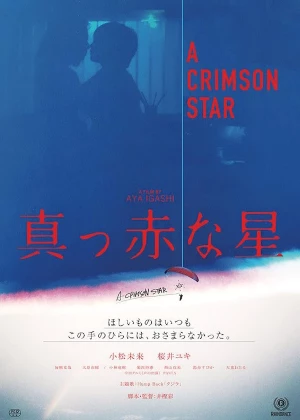A Crimson Star

Aya Igashi is one of Japan's rising stars, so when I got the chance to watch A Crimson Star [Makkana Hoshi], her first feature-length film, I didn't have to think twice. It's good to see that female directors are getting more opportunities nowadays, it's especially heartwarming that younger directors aren't being forgotten in the process. Getting your hands on a film like this is still a bit of a challenge for anyone living outside of Japan, but at least they're being made, and dedicated fans will always find a way. It was certainly worth the trouble as A Crimson Star turned out to be a strong, poignant drama.
![screencap of A Crimson Star [Makkana Hoshi]](/thumbs/img/articles/1200xauto/crimson-star-1.webp)
When she made A Crimson Star, Igashi was only 22 years old. That's incredibly young for a director of a feature film, but it's exactly the kind of voices cinema is lacking. She tackles some touchier themes head-on, not afraid to ruffle some feathers or to upset certain people. Not that the lesbian themes are earth-shattering or pushing the limits, but it's a far cry from someone like Ogigami making Close-Knit. There's a relevance and urgency here that you won't necessarily see from more seasoned (read older) directors, which is exactly why I like seeking out films like this.
A Crimson Star is a film that combines various dramatic storylines. One about child abuse, one about a blossoming lesbian relationship, and one about dealing with past trauma. That's quite a lot of misery and pain to deal with, but Igashi also has an eye for the more beautiful moments and zooms in on the relationship between these two women. The mix between drama and romance isn't perfectly balanced, but it's exactly that youthful energy that gives the film a little extra edge and character. More polish would've ended up making the film not worse, but certainly less exciting.
Yo is smitten by Yayoi, a nurse who tended to her while she was in the hospital. But Yayoi suddenly disappeared without a trace. Some time later Yo bumps into Yayoi, who is now prostituting herself. Because her home situation is terrible, Yo decides she wants to live with Yayoi, who is battling demons of her own. Yayoi figures it's okay to let Yo stay for a while, and the two develop a friendship. But Yo's love is suffocating Yayoi, especially as she still has a few residual men in her life. When Yayoi notices her unstable life is rubbing off on Yo, she tries to push her away.
![screencap of A Crimson Star [Makkana Hoshi]](/thumbs/img/articles/1200xauto/crimson-star-2.webp)
Igashi loves the Japanese countryside and she sure knows how to capture it. The bright summery blues and greens are an absolute delight and they're one of the things that stuck with me after I'd watched Leave of Summer. The camera work and framing are impressive too, as are the close-up shots of the actors. It's not the most original visual language, Igashi isn't reinventing the wheel, but put together it creates enough of a signature to set her work apart from all the other Japanese dramas out there. To have that signature at such a young age is impressive.
The score is pleasant but it's not quite as memorable or remarkable as some other aspects. It's very much in line with other Japanese dramas, not demanding too much attention while providing a gentle, comfortable, and soothing atmosphere. It's certainly acceptable for a film by a first-timer and it's never in the way, but I would've hoped for something with a bit more character from such a young director. It's one of the easiest ways to distinguish your film and further shape your signature after all. Igashi would go bolder in her later films, so I guess it was more a matter of getting the basics right first.
The acting is a clear step above average. Miku Komatsu is excellent as Yo, but it's Yuki Sakurai who leaves the biggest impression. That's not a big surprise, she managed to stand out in just about everything I've seen her in so far, but this time there is nothing for her to hide behind. This is a pure character drama and she fully aced her role. The secondary cast is pleasant too, but they get considerably less time to prove themselves, and they're mostly there to provide extra narrative drama. It's all about the two leads here and they did a terrific job.
![screencap of A Crimson Star [Makkana Hoshi]](/thumbs/img/articles/1200xauto/crimson-star-3.webp)
People who have seen a couple of Japanese dramas should know what to expect from A Crimson Star. It's not the most predictable film, there are some little twists and turns, but none of them are too defining. It isn't the type of film where every narrative strand is neatly wrapped up at the end though, but there is a sense of resolution and with the core focus on the transformation of the characters, I feel Igashi managed to include the most important bits. It's also nice that she didn't need the full 120 minutes to finish things, so there's not much in the way of unnecessary padding.
A Crimson Star is a film for fans of Japanese dramas. Aya Igashi's youthful demeanor and signature elements have a sizeable impact on the overall quality, but nothing that will sway any detractors of the genre. The performances are great, the cinematography is inviting, the score is pleasant and the drama is potent, all signaling the budding talent of a young director. It's good to see that Igashi persevered and is already a few films into a promising career. Japan needs talent like her to ensure its cinematic future, even when most of it is still aimed at their local market.